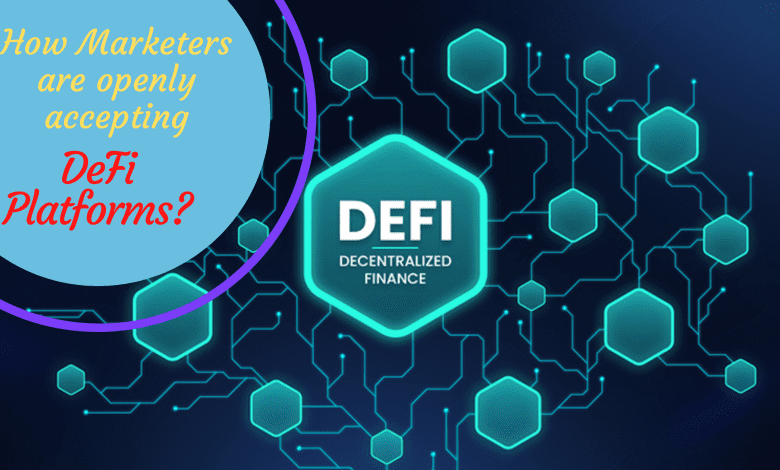How Marketers are openly accepting DeFi Platforms?

As of 2020, nearly two billion people are “unbanked” and lack access to essential financial services, with the majority living in high-growth emerging nations. The main cause of this issue is a lack of banking infrastructure in these nations. Decentralized finance (DeFi) development company can provide lower-cost services to these excluded groups while also increasing global financial inclusion.
Financial access is frequently associated with a country’s ability to grow economically and financially. Thus, the unbanked can start transacting through a network of decentralized platforms built on cutting-edge blockchain technologies. Thereby taking part in wealth creation potential locally and globally.
The term “DeFi” has taken over the world of banking and technology. It has completely transformed the world of traditional finance. DeFi, as the name implies, is a network of decentralized elements that collaborate on several immutable blockchain networks to provide customers with low-cost financial services. They can also merge due to the built-in feature of interoperability.
What precisely does DeFi mean?
DeFi is an abbreviation for Decentralized Finance. It is a Blockchain-based financial system that operates independently of traditional financial intermediaries such as banks, exchanges, and brokerages to provide financial services to its customers.
The DeFi system is a practical financial system that offers more than typical financial intermediaries.
For example, you might lend and borrow funds on DeFi Platforms, as well as forecast price movements on a range of assets, insure against risks, and so on.
Furthermore, several DeFi applications offer large interest rates, which are frequently accompanied by equivalent risk factors. DeFi exposes you to global marketplaces and more viable alternatives to traditional banking and currencies.
We’re talking about an open financial system that relies only on technology as an alternative to the relatively slow, prone to manipulation, monopolistic, and legalistic banking system.
DeFi removes the financial intermediaries in your transaction. In other words, it immerses you in the technology that affects the outcome of your investments. You can view and control your assets on a blockchain in this manner.
The demand for DeFi
The existing financial ecosystem was viewed as smart and efficient, with prices kept as low as feasible and transaction speeds kept as high as possible. However, when cryptocurrency and blockchain technologies were introduced, people began to question the cost of each transaction and why it takes weeks to complete an international money transfer.
It turns out that the entire ecosystem has a large number of intermediaries/third parties, which translates into costs. All of these third parties can be totally deleted from the system with DeFi, significantly lowering transaction costs. Furthermore, because the entire DeFi system operates on secure blockchain networks, the reach is global and transactions are practically instantaneously processed.
Special Attention to Smart Contracts
The purpose of third parties in the financial ecosystem is to build trust and provide arbitration. How does DeFi handle this critical requirement?
They are efficiently addressed by a small self-executing program known as a smart contract, which can be seen as the blockchain ecosystem’s critical architecture. They are programmed to perform specific actions if and only if specified requirements and conditions are met. The smart contract, like every other member of the blockchain network, is rigid and cannot be tampered with.
This means that the smart contract handles the trust that must be developed by the third party. Smart contacts also increase the degree of people’s trust because there is no human interaction. In the DeFi ecosystem, smart contracts serve a wide range of tasks, including establishing an escrow mechanism for the peer-to-peer movement of funds, effectively managing liquidity pools, and guaranteeing interest payments to investors.
The applications and opportunities that can be pursued
If DeFi ought to replace traditional finance, it must supply all of the services previously provided, plus a few more. As promised, DeFi provides several options for all people to obtain financial services without encountering economic or social prejudice.
DeFi allows you to completely tokenize any asset over the blockchain network. The entire procedure can be completed without the involvement of other parties or centralized authority. This would imply increasing liquidity for assets that were previously thought to be particularly difficult to sell. Commercial real estate, collectibles, fine art, and precious metals are examples of assets in this category. This would also raise the likelihood of partial and fragmented ownership. As a result, it diversifies the investment portfolio, making previously inaccessible asset classes such as commercial real estate more accessible to both small and institutional investors.
Decentralized cryptocurrency exchanges are sweeping the globe. They eliminate the centralization that has been responsible for some of the most egregious security breaches in the form of hacking assaults in the blockchain realm. These DeFi crypto exchanges ensure that users’ funds are always under their control, and they also do not have access to the private keys of crypto traders’ wallets. Users can place crypto funds in a smart contract escrow to be exchanged. The money is released by the escrow only once both the buyer and seller of crypto have confirmed payment.
Borrowing and Lending
Borrowing and lending are essential components of traditional finance, and DeFi easily facilitates the same behaviors. Users must overcollateralize their assets by depositing more cryptocurrencies as collateral than they want to borrow. While this may appear odd, it makes sense because some users may not want to sell their crypto money but rather keep it secure. The smart contract manages the entire purchasing and selling procedure.
Liquidity Pools
Liquidity pools are used to form the “Bank” for people to borrow crypto assets. Users can contribute to this liquidity pool and receive interest on the funds they deposit for use by borrowers. A smart contract protects the liquidity pool, which is incredibly secure. The liquidity pool, as the name implies, is in charge of ensuring that users’ lending and borrowing of cash runs smoothly.
DeFi’s contribution to financial inclusion
DeFi now offers borderless crypto asset markets access to larger liquidity pools, lowering transaction costs for market participants dramatically. Today, some decentralized exchanges offer better and more trader-friendly exchange rates for financial assets than centralized exchanges and siloed service providers.
Extending access to crypto-asset markets, if done properly, will lead to greater financial inclusion in poor countries. One of the United Nations Sustainable Development Goals (SDG) is to increase access to digital financial services. And DeFi is at the forefront of this effort. According to the United Nations, inclusion is a critical enabler of other sustainable development goals. Like reducing inequality, alleviating poverty, ending hunger, and economically empowering women. Thus, DeFi, with its zero-marginal-cost and internet-native services, can serve the underserved population. At the same time, giving access to financial services can promote the SDG if used effectively.
Real-time examples in Venezuela and Zimbabwe
It is frequently argued in emerging markets in the global south that DeFi has the ability to change developing economies plagued by inflation and volatile national currencies. Citizens in these countries, such as Zimbabwe and Venezuela, face severe monetary mismanagement. Zimbabwe’s inflation rate has been steadily rising since 2017, and it is expected to reach 557% by 2020. Venezuela, a politically volatile country, saw about 65,000% inflation in 2018, prompting the government to limit cash and credit spending limitations in bolivars (the official currency of Venezuela) in order to maintain currency stability.
For these and other countries in the same category, DeFi provides a safe and beneficial alternative to avoid volatile national currencies. This helps to access financial services that would otherwise be unavailable. While we may focus on paying for goods and services, DeFi’s pitch is to assist individuals afflicted by rapidly devaluing national currencies. Moreover, inaccessible vital banking needs in saving, trading, and investing for their future. It does, however, pose a threat to incumbent banks and systems. This strives to maintain power despite failing their citizens in a spectacular way.
Future of Decentralized Finance
In recent years, the exponential rise of DeFi has been largely driven by technological, social, and macro dynamics. Volumes will expand as more people adopt DeFi and more effort is devoted toward the creation of more DeFi protocols and dApps. It will become easier to use and more efficient for the mainstream to participate.
In the future, customers will most likely be rewarded with tokens. Using their accounts, support the environment, social causes, or other community activities.
DeFi’s long-term goal is to provide communities with a smooth and comprehensive financial experience from anywhere in the world. A decentralized ecosystem lowers geography, status, and wealth barriers by providing unbanked persons with access to new entrepreneurship. Likewise, wealth creation opportunities, lending and borrowing facilities, remittances, digital payments, and other financial services. In the process, DeFi can assist to alleviate global poverty and make global payments more accessible and affordable. According to PwC, blockchain will reduce average global remittance expenses from 5% to less than 1%.
Conclusion
Whatever the case, DeFi is still in its early phases, and it will take time for it to mature in terms of practicality and security. With the widespread use of blockchain technology by enterprises, it will become the go-to financial approach not only in advanced economies but around the world.
If you want to be one of the companies that leads this massive transformation, you may contact a top-tier DeFi development company. An expert decentralized finance development company will take the time to understand your business needs. And gives you appropriate solutions to help your company become a pioneer in the DeFi area in the near future.





